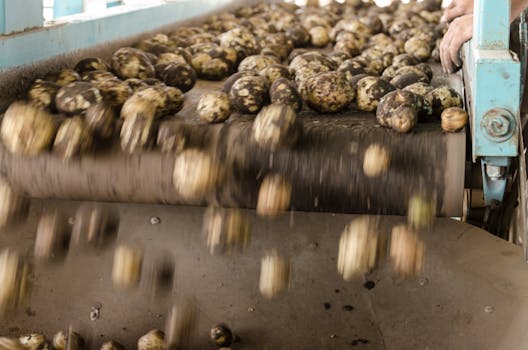Anuncios
The food industry is on the brink of a technological revolution, poised to reshape the way we produce, consume, and think about our food. Advances in food technology promise enhanced efficiency, sustainability, and accessibility, driving major changes across the sector.
As we delve into the future of food technology, it’s essential to recognize how innovations in this field can address pressing global challenges. These include food security, environmental sustainability, and health concerns, all crucial for improving our diets and lifestyles.
The integration of artificial intelligence, robotics, and biotechnology gives rise to exciting possibilities. This article explores emerging trends, innovations, and implications of food technology that could transform our relationship with food for generations to come.
The Role of Artificial Intelligence in Food Production
Artificial intelligence (AI) is becoming increasingly vital in modern agriculture, enabling farmers to optimize yields and manage resources more efficiently. By analyzing data, AI can provide insights into crop health and optimal planting schedules.
Machine learning algorithms help predict weather patterns, allowing farmers to make informed decisions. Thus, AI contributes to reducing crop losses and improving food availability, a pressing global concern.
Anuncios
Automated systems powered by AI offer precision agriculture capabilities. This technology can monitor soil conditions and moisture levels, targeting resources exactly where needed. Consequently, farmers can increase their productivity while minimizing environmental impact.
Furthermore, food producers are harnessing AI for inventory management and demand forecasting. This innovation helps to minimize waste while ensuring a steady supply of fresh food products in stores.
Overall, AI is playing a transformative role in the agricultural sector. By embracing these technologies, farmers and food producers can enhance both efficiency and sustainability.
Anuncios
Emerging Biotechnologies: Lab-Grown and Cultured Foods
Lab-grown foods, also known as cultured foods, are gaining traction as a sustainable alternative to traditional meat production. This innovative technology involves cultivating animal cells in a controlled environment to produce meat without raising animals.
These cultured products could significantly reduce greenhouse gas emissions associated with livestock farming. As such, they present a viable solution to combat climate change while meeting growing protein demands.
The development of lab-grown foods also fosters increased food safety. Since these products are grown in sterile conditions, the risk of contamination from bacteria or pathogens decreases considerably.
As consumers are becoming more health-conscious, cultured foods offer a chance to develop healthier alternatives. They can be engineered to contain less fat and more nutrients compared to conventional meat.
Ultimately, lab-grown foods could reshape dietary habits and improve food systems. As acceptance grows, the future of food may prominently feature these innovative products on our plates.
Robotics and Automation in Food Processing
Robots are steadily making their way into food processing, enhancing efficiency and consistency in production. By automating repetitive tasks, such as packaging and sorting, industries can reduce labor costs and improve overall productivity.
Automation enhances precision in food production, ensuring uniformity and quality in processed products. Such advancements may help to reduce waste and improve food preservation techniques.
In addition, robots equipped with sophisticated sensors can monitor production lines for quality control. This technology enables quicker identification of issues, minimizing downtime and wasted materials.
Furthermore, robotic food preparation in restaurants and kitchens is on the rise. These innovations promise to enhance customer experiences while addressing labor shortages in the hospitality sector.
In summary, robotics in food processing could usher in a new era of efficiency. The integration of these technologies demonstrates a commitment to better resource management in the food industry.
Food Delivery and E-Commerce Innovations
The rising demand for convenience in food purchasing has spurred innovations in food delivery and e-commerce systems. Consumers now expect a seamless online experience when shopping for groceries and meal kits.
Artificial intelligence plays a role in enhancing user experiences through personalized recommendations based on consumer preferences. This helps streamline the online shopping process and promotes customer satisfaction.
Moreover, advancements in logistics and last-mile delivery are improving the speed and reliability of food deliveries. With the increasing popularity of food delivery platforms, consumer choices have expanded dramatically.
Subscription-based models also continue to gain traction, allowing consumers to receive regular deliveries of fresh ingredients or prepared meals. This approach fosters a vibrant connection between consumers and food producers.
As a result, the landscape of food shopping is evolving rapidly. The integration of technology in food delivery offers exciting possibilities for enhancing convenience and consumer engagement.
Sustainable Practices and Food Technology
The future of food technology is closely intertwined with sustainability. Innovations are helping to minimize the environmental impact associated with food production, packaging, and distribution.
For instance, vertical farming techniques are gaining popularity as an efficient way to grow food in urban areas. This method maximizes space while reducing the need for pesticides and transportation emissions.
Food technology is also addressing packaging waste with the development of biodegradable and compostable materials. Such advancements encourage sustainable consumption habits and reduce landfill contributions.
Moreover, innovations in food preservation techniques, such as high-pressure processing, extend shelf life without harmful chemicals. This contributes to reduced food spoilage and improved food safety.
Embracing sustainable food technologies lays the groundwork for a healthier planet. The future of food depends on our commitment to innovative practices that prioritize the environment.
Nutrition Technology: Personalized Diets and Nutrition Tracking
Technological advancements are paving the way for personalized nutrition, catering to individual dietary preferences and health goals. Nutrition tracking applications empower consumers to monitor their food intake and make informed choices.
Data analytics enables these applications to offer tailored meal plans and nutrient insights, based on users’ specific health needs. Thus, individuals can align their eating habits with their wellness objectives.
Moreover, wearable technology, such as fitness trackers and smartwatches, enhances the ability to gather health data. These devices can monitor indicators like heart rate and activity levels, integrating with nutrition apps for comprehensive health management.
As a result, consumers are becoming more educated about their nutrition, promoting healthier lifestyles. This trend signals improvements in public health and a greater emphasis on wellness.
Ultimately, nutrition technology equips individuals with the knowledge and tools needed to enhance their well-being. Personalized diets represent a transformative shift in how we approach nutrition.
Conclusion: Embracing the Future of Food Technology
The future of food technology holds immense potential for transforming the landscape of our eating habits and food systems. By embracing advancements in AI, biotechnology, robotics, and sustainability, we can tackle global challenges.
Innovative approaches offer solutions to issues like food security, environmental degradation, and health concerns. As consumers, industries, and governments work together, we can build a nutritious and sustainable food future.
Ultimately, the integration of technology into the food industry is not just about enhancing efficiency; it’s about fostering a deeper connection to the food we consume. Let us champion these innovations for a healthier planet and population.



